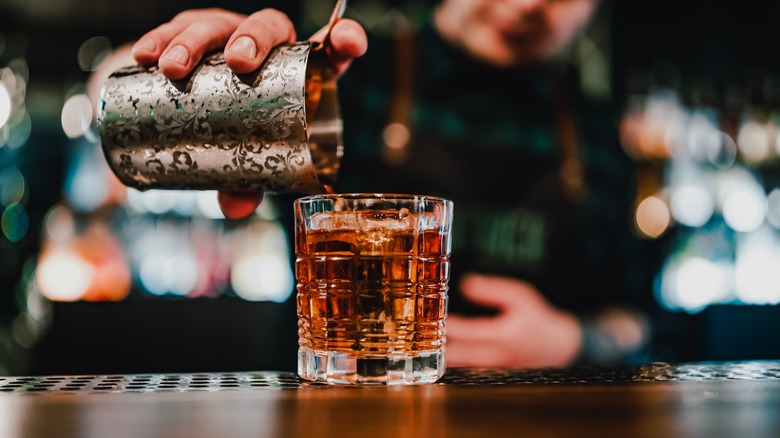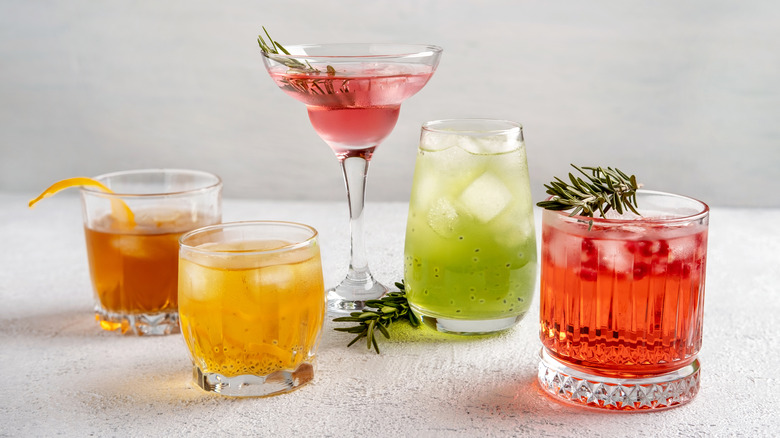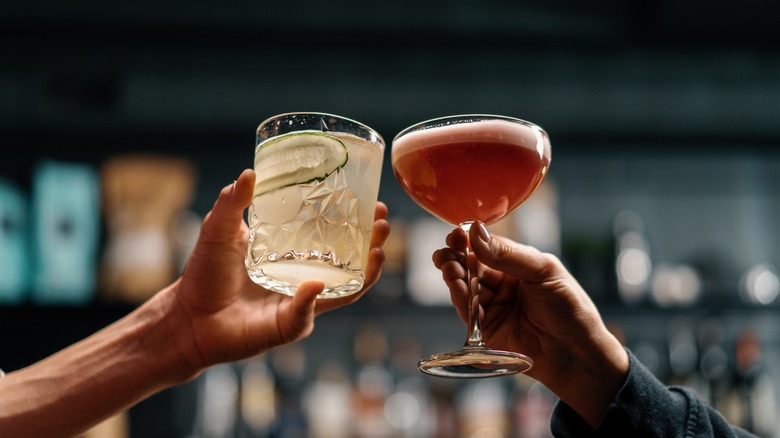Where Does The Word 'Cocktail' Come From?
From Manhattans to Mojitos and everything in between, cocktails offer exciting and varied flavors to suit any palette. If you're a cocktail connoisseur, chances are you already know most of the basics about these beverages, like that it is the inclusion of a third ingredient that differentiates them from two-ingredient mixed drinks. However, one fact that eludes mixologists and amateurs alike is how the word "cocktail" came to be. It's a complicated question with more than a few possible answers, but with a drink in hand, we can find some likely conclusions.
One theory is that back in the olden days, the remnants of various liquor barrels would be thrown into a glass to serve as a sort of end-of-day special for taverns. The combination of the barrel tap, known as a "cock," and the dregs of spirits, known as "tailings," created "cocktailings," which eventually evolved into "cocktail." Others propose that "cocktail" is an Americanized version of the French word coquetier, which refers to an eggcup. As the story goes, Antoine Amédée Peychaud, the inventor of Peychaud's Bitters, would use an eggcup to serve mixtures of brandy and bitters. Coquetier was pronounced as "cocktay" by Americans and then transformed to "cocktail."
The most likely story
As interesting as those stories are, the most compelling hypothesis on the origin of the word "cocktail" has surprisingly little to do with actual drinks. According to the Oxford Dictionary, a "cocktail" initially referred to a horse that's tail was cut so that it stuck up straight like a chicken, or "cock." Because it was workhorses that typically had their tails docked rather than thoroughbred racehorses, "cocktail" took on the meaning of a horse with mixed blood. Eventually, people started to use this term to refer to mixed drinks.
The word "cocktail" was occasionally used to describe drinks in the early 1800s, but it wasn't officially defined until May 13, 1806, in a column of The Balance and Columbian Repository newspaper. In a reply to a reader who was curious about the term, the paper's editor wrote, "Cock-tail, then, is a stimulating liquor, composed of spirits of any kind, sugar, water, and bitters" (via Difford's Guide). At first, a cocktail was specifically a liquor with sugar, water, and bitters, but in time, it came to encompass multiple other recipes.
The first cocktail
One can assume that people were mixing spirits and other ingredients together for a long time before anyone named it. Old advertisements for products like Dr. Copp's White Mountain Bitters show that they were thought to cure ailments like indigestion, fever, and jaundice, so it's possible some of the first cocktails were created in an attempt to craft some kind of medicine. It is generally agreed upon that the Sazerac was the first official cocktail. Invented in 1838 in New Orleans, this iconic cocktail features Absinthe, whiskey, Peychaud's bitters, sugar, and water.
Cocktails became increasingly popular throughout the 19th century, eventually leading to developments like Jerry "Professor" Thomas' "The Bartender's Guide" in 1862. This was the first mixology book ever published and featured recipes for cocktails still enjoyed today, like the mint julep. Bartenders' growing creativity and ice becoming more readily available led to a golden age of mixology, with cocktails continuing to be invented throughout the following decades. It's hard to imagine a world without cocktails, but luckily, that's not a scenario we have to live in. The next time you're enjoying a cocktail with a friend, share the story of the term's origins and raise a toast to the cocktailed horses that lent their name to this irreplaceable beverage.


